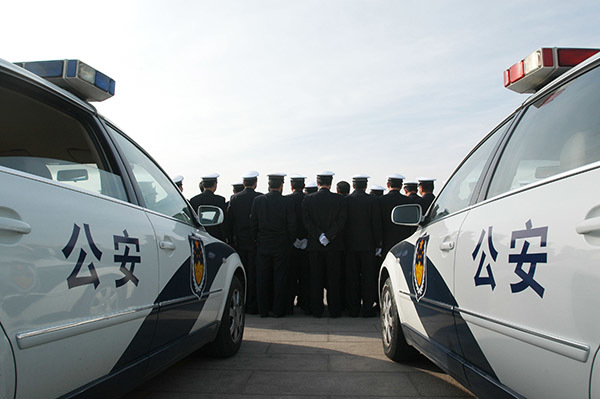The Chinese Communist Party uses American college campuses to control students who exercise freedom of speech at universities. (Dajiyuan, Getty Images)
[People News] The Chinese Communist Party (CCP) has been leveraging overseas Chinese communities to interfere in local political and social affairs, exerting significant influence—an issue that has caught the attention of governments worldwide. What tactics does the CCP use to tie the interests of Chinese communities, recruit pro-CCP forces, engage them in official tasks, intimidate dissidents, and manipulate public opinion?
According to a Radio Free Asia (RFA) report, Lin Linqi, an independent Chinese journalist who previously reported on the arrest of Wuhan citizen journalist Fang Bin, the ink-throwing protest girl, and Chinese soldiers occupying Uyghur homes in Xinjiang, fled China during the pandemic and now resides in France. Lin recalled that when CCP leader Xi Jinping visited France last year, he participated in protests outside the Chinese embassy. During that time, he observed a large number of logistics companies, bars, and trade associations sending vehicles in and out of the embassy, indicating that private businesses were actively involved in CCP-related activities.
Having spent two years in Cambodia, Lin also noted that the CCP often operates abroad through quasi-official or semi-official organizations rather than direct government action. Many of these organizations are led by individuals with ties to China’s Ministry of State Security (MSS), and they implement CCP policies through businesses such as hotels and trade associations.
Lin pointed out that many Chinese people in France, including political asylum seekers, fear openly protesting against the CCP. He observed that many business owners, particularly Wenzhou merchants, engage in trade and refuse to hire Tibetans or people who protest against the CCP, labeling them as “separatists.”
Masquerading as Private Enterprises
Last year, when Chinese nationalist influencers protested outside Taiwan’s EVA Air hotel in Paris because it did not display the Chinese flag, Lin went to support the hotel. He revealed that the group leading the boycott, the French Council for the Promotion of Peaceful Reunification of China (French CPAFFC), is actually a semi-official CCP organization. The president of the French CPAFFC is a Wenzhou native, and the CCP frequently holds embassy meetings, New Year banquets, and other events at his hotel.
Lin further described how, following the online harassment campaign, the French CPAFFC swiftly mobilized around 50 Chinese trade associations in Paris to host a reception for the nationalist influencer, likely rewarding them with financial incentives. "They organized a petition and declared that all Chinese trade associations in France supported the collective bullying of EVA Air hotel in Taiwan, which lasted for more than ten days," Lin recounted.
When Lin and his friends went to protest outside the French CPAFFC's office, they found that the organization operated from a mixed-use residential and commercial building and deliberately avoided displaying any signage, likely to avoid scrutiny.
Fake Charity Groups
Another method the Chinese Communist Party (CCP) uses for its overseas operations is creating fake "charity groups" and non-profit organizations that assist with passport exchanges, travel permits, and other services. According to Lin Linqi, a former independent Chinese journalist, who observed the situation in both Cambodia and France, the process is always the same: when visiting the embassy, services can only be processed quickly and efficiently with the help of people with connections.
Lin explained that the CCP prioritizes its own people for these services, such as certain travel agencies, hotels, intermediary law firms, and business groups. These organizations are then co-opted through "tied interests," and are incentivized with a commission—creating a "community of interest" benefiting from this system of money and power.
Lin further shared that former Chinese ambassador to France Lu Shaye and other officials often interacted with these "charity groups". These groups operate similarly to Beijing’s "Chaoyang Da Ma" (vigilantes), presenting themselves as volunteers or engaged in public service activities. For example, when the Chinese government distributed vaccines, Lianhua Qingwen capsules, and face masks in countries like Cambodia and France, these charity groups or business associations—designated by the Chinese embassy—were in charge of purchasing supplies. They would transmit the CCP's values and benefits through these activities, essentially completing tasks the Chinese consulates couldn’t directly carry out.
Lin continued, noting that trade groups led by influential Chinese community leaders or Wenzhou businessmen are controlled by the embassy. These groups help manage tour groups, translations, and certifications for the CCP, creating a system where "intermediaries" earn a profit. For visiting Chinese tour groups, the embassy certifies hotels and restaurants, cementing a "binding of interests."
Lin also revealed that these "charity groups" can even go as far as kidnapping political asylum seekers who are critical of the CCP, taking them to airports in France to send them back to China. He reported that this incident was captured by a French journalist at Charles de Gaulle Airport, leading the French government to expel two Chinese diplomats and deport the individuals from these organizations. This was later reported by Le Monde and other French media outlets.
The "Television Box" Business That Doesn’t Profit
Aside from tying interests, the CCP also operates businesses that seem unprofitable at first glance. Jie Lijian, a Chinese dissident in exile in the United States, noted that the CCP uses phone cards and TV boxes to widely distribute CCP official programming to overseas Chinese communities. These services brainwash Chinese nationals abroad by broadcasting the party’s propaganda every day, all at a loss.
Jie explained: "When you search for Chinese channels, you get CCTV, Hainan TV, Guangzhou TV, Hong Kong Phoenix TV, and Taiwan's Zhongtian TV, which are all pro-CCP channels. For example, if you pay $30 or $50 a month, they give you an additional 6 months. Or if you pay for 3 months, you get a year. What’s the profit? Who is giving you the service? How are the funds being used? In the United States, it costs $60 or $70 a month for the service, and they still install it at a loss. Without large financial backing, these companies would go bankrupt."
More disturbingly, Jie pointed out that personal information from users of these TV boxes may be sent back to the headquarters in Beijing. These devices have monitoring, recording, and video surveillance functions, which means users lose all privacy in their own homes. Not only is this a form of propaganda to glorify the CCP, but it also poses a significant privacy risk, as the CCP could be stealing sensitive personal information—equivalent to a cyber invasion.
Supporting New Organizations to Manipulate Public Opinion
Jie Lijian mentioned that especially after the new Chinese Minister of National Security took office, the focus shifted overseas to attack Falun Gong, overseas groups, and anti-communist factions. "Many so-called new organizations have popped up like mushrooms, and their funding is unclear. Some well-known dissident leaders participate in events and lectures with high compensation. The core ideology they spread is that they hope the Chinese government will change and democratize, not to overthrow it, which aligns with the official stance. This is vastly different from the call to end the Communist Party, prosecute Xi Jinping, and hold Communist Party criminals accountable."
Jie Lijian, who was previously imprisoned in a Chinese psychiatric hospital and subjected to abuse, fled to California, where he often organizes protests and lectures exposing the crimes of the Chinese government. He revealed that he frequently receives threatening emails and is followed by unknown vehicles, placed under surveillance, and even attacked in his home, in an attempt to intimidate him into stopping. The Communist Party also exerts pressure through local fellowship associations, targeting Chinese business owners and clients who hire active anti-communist individuals, leading to job losses and failed business deals. Some hotels and restaurants even refuse to serve them, treating them as "wanted criminals."
Control of Resources to Make Life Difficult for Dissidents
Jie Lijian recounted an incident where he tried to show the banned Chinese documentary "Wukan", but things went awry. "That afternoon, over a hundred people came, spending $60 each on food, which generated several thousand dollars in sales. But suddenly, the restaurant refused to continue, saying that relevant authorities had warned them, and they were scared. How much power must be behind that to control such a big business deal?"
He pointed out that fellowship association presidents and restaurant association leaders are often also National People's Congress representatives, executing the Communist Party's control over the food and service industries. They manage local events like National Day banquets and influence everything from suppliers to deliveries, effectively creating a shadow government within the Chinese community.
Defamation, framing, and deception are also common tactics. Jie Lijian shared that once a woman expressed sympathy for his situation after an event and invited him to dinner. He remained cautious and avoided meeting her privately. "After several invitations, and me not taking the bait, she stopped attending events. Her Telegram account was deactivated, as if she had disappeared. This happened multiple times, and these are common tricks the Communist Party uses to set traps for people."
He explained that pro-communist individuals would sometimes take photos of him and send them to U.S. law enforcement to smear his reputation, falsely accusing him of possessing dangerous materials, or attempting to "discredit" him if they couldn't directly win him over.
China also uses fellowship associations, business trade associations, and other community leaders to donate and support pro-communist political figures in the U.S., while attacking their opponents. U.S. Secretary of State Marco Rubio warned before his appointment that China’s infiltration is extensive, and the CCP is corroding everything in America.
Chinese Government’s Internet Censorship Extends Overseas
Chinese internet censorship has also extended to overseas Chinese communities. Lin Linqi gave examples of many Chinese-language forums and online platforms in Europe and the U.S. that are registered in China, with their moderators also based there, and these platforms must comply with Chinese laws.
Lin said: "You can't criticize Xi Jinping, you can't criticize the Communist Party, and you can't express any free speech. For example, posts from Tibetans wanting to protest are deleted. When we supported the Evergreen Hotel, the posts criticizing Taiwanese independence activists were allowed to remain. This shows you that even though you're in France, you still experience Chinese-style censorship and criticism, just like you’re still in China. You can't say what you want; it's like living under the Communist Party's surveillance even when you're abroad."











News magazine bootstrap themes!
I like this themes, fast loading and look profesional
Thank you Carlos!
You're welcome!
Please support me with give positive rating!
Yes Sure!